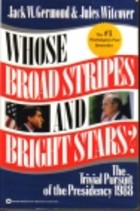Whose Broad Stripes And Bright Stars?
Whose Broad Stripes And Bright Stars?
Author:
Book Binding:
Condition:
Pages:
Couldn't load pickup availability
America's premier campaign journalists Jack W Germond and Jules Witcover, have been covering national politics and presidential campaigns for thirty years. Their in-depth examinations and inside stories of America's presidential races, beginning with Kennedy/Nixon in 1960, have made them, according to the "Dallas Morning News", "the successors to Theodore White in providing the definitive campaign history." But never have their experience and analysis of a campaign been more important than now, when sound bites became the most crucial political tool, "hired guns" ran the most mean-spirited and negative campaign in modern-day American political history, and confused voters wondered what it all meant. Despite President Bush's postcampaign vision of a "kinder, gentler nation," what the authors call the "anything goes" 1988 campaign may signal a dangerous sea change in how we elect a president.
In WHOSE BROAD STRIPES AND BRIGHT STARS? Germond and Witcover bring us an unflinching report on what went on in the 1988 campaign, an analysis of how the process has changed over their three decades of personal observing, and what this means for future elections. They tell how Gary Hart self-destructed, what happened to Joe Biden, where Jesse Jackson peaked and then failed, how Dick Gephardt took Iowa, and why Super Tuesday was a miserable fiasco. All the ups and downs of the primaries, the mistakes and the brilliant maneuvers, and the final victories of Bush and Dukakis as their parties' nominees are revealed in dramatic, acidly truthful reporting and in firsthand interviews with the candidates and their behind-the-scenes "handlers."
Germond and Witcover then spell out how the Bush campaign's strategists turned a bland figure give to gaffes and subject to wide ridicule as "wimp" into a near-landslide winner. Driving up the "negatives" of their opponent, the experienced political handlers of the Bush campaign constructed a campaign of distortion, character assassination, and division---that worked. Germond and Witcover show how Bush did it...and how Dukakis blew it. They analyze how the "killer question" that led off the second TV debate finished Dukakis as a viable candidate, and they skillfully examine how TV news has come to shape voters' perceptions of candidates and the issues.

